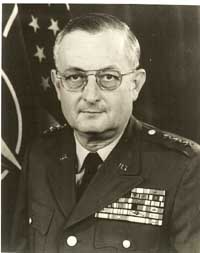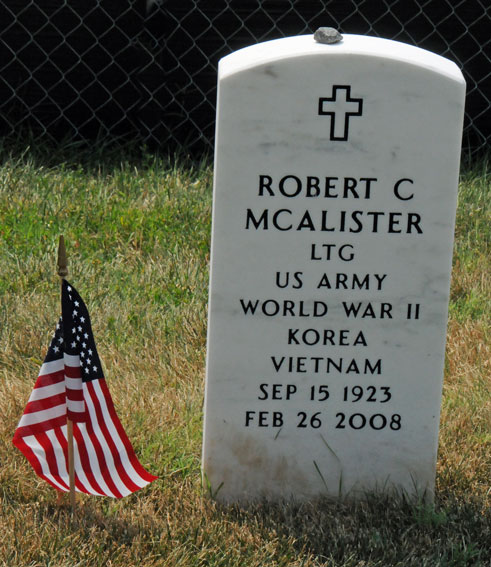Birth: September 15, 1923 at Mayfield, Graves County, Kentucky
Death: February 26, 2008 at Melbourne, Brevard County, Florida
Burial: Arlington National Cemetery, Plot: SECTION 60 GRAVE 85
General McAlister‘s distinguished career spanned nearly forty years of command and staff service in peace and in war, and was marked by a profound love of country, intellectual discipline, compassion, and competence. He was, in the words of one of his dearest friends, a magnificent soldier and man.
General McAlister graduated Mayfield High School in 1941, and was appointed to the United States Military Academy at West Point from Kentucky’s First Congressional District, graduating in 1945.
General McAlister served in the U.S. Constabulary forces in occupied Germany, where he met his future bride, Martha Sebree of Olney, Illinois who was living in Germany with her parents; it was, as he later said, the best score Kentucky ever made.
The couple was married in 1950, and within ten days, then-Lieutenant McAlister deployed with the storied Third Infantry Division to Korea. General McAlister commanded Battery A, 10th Field Artillery in close combat from the Naktong to the Yalu, and his unit was one of the very last evacuated at Hungnam following the Chinese entry into the war.
Upon his return to the United States, General McAlister was selected to attend the U.S. Army Command and General Staff College as a captain a distinction normally reserved for Majors graduating second in a class of three hundred.
Following distinguished service in staff and line positions, General McAlister was selected to attend the U.S. Army War College as a Major, and earned a Masters Degree in International Relations from George Washington University.
General McAlister commanded the 5th Battalion, 16th Field Artillery and served as the Operations Officer for the 4th Infantry Division. Following service as an operations staff officer in Panama, General McAlister was selected to command the 4th Infantry Division Artillery in the Republic of Vietnam. In that capacity, the late General William R. Peers described him as the best tube-gunner in the United States Army. Promoted to Brigadier General in 1968, General McAlister served as the Assistant Division Commander of the 4th Infantry Division in the Central Highlands of Vietnam, and participated in the battle of Dak To as well as the Tet Offensive.
Following a tour in the International Security Agency of the Department of Defense, General McAlister was promoted to Major General and tapped to command the Southern European Task Force in Vicenza, Italy, with units in Italy, Greece, and Turkey.
Among General McAlister’s most important contributions to the Army came in 1973, when he was selected to lead the Army’s Combat Development function. This was a critical juncture in the US Army’s history, as the Army restructured its training, doctrine, and equipment to face post-Vietnam challenges. With the end of the Vietnam War, the end of the draft, and a growing threat from a numerically superior Soviet army deployed in Europe, the Army had to reexamine and restructure the way that it trained, equipped, and deployed its forces.
Tasked to provide material support and to project future equipment needs to support the Army’s worldwide mission, General McAlister’s contributions included the prototype for the M-1 Abrams Main Battle Tank, the UH-60 Blackhawk Helicopter, and the Multiple Launch Rocket System, all of which remain in service today. The late General William DePuy described General McAlister as the smartest man in the Army, bar none.
In 1975, General McAlister was promoted to Lieutenant General, one of only 19 officers to hold that rank in an Army that then numbered over 700,000. Assigned as Chief of Staff, Allied Forces Southern Europe, General McAlister successfully negotiated the resumption of joint military exercises between Greece and Turkey, following several years of strained relations over the occupation of Cyprus. General McAlister’s final assignment was as Chief of Staff, United States European Command, responsible for U.S. military operations spread from Iceland to Africa and from Spain to Iran.
Following his retirement in 1980, General and Mrs. McAlister settled in Melbourne, Florida, where General McAlister continued to serve his community as a member of the National Board of Counselors of the Military Officers Association of America.
Among General McAlister’s awards and decorations are: the Defense Distinguished Service Medal with Oak Leaf Cluster, the Army Distinguished Service Medal, the Defense Superior Service Medal, the Legion of Merit with Oak Leaf Cluster, the Bronze Star Medal with V device for valor in combat and oak leaf cluster, the Air Medal with nine awards, the Purple Heart Medal for wounds received in combat, the Joint Service Commendation Medal, the Army Commendation Medal, the Army of Occupation Medal (Germany), the Commendatore della Republica Italiana (Italy) as well as numerous campaign and service ribbons.
MCALISTER, ROBERT C
- LTG US ARMY
- WORLD WAR II, KOREA, VIETNAM
- DATE OF BIRTH: 09/15/1923
- DATE OF DEATH: 02/26/2008
- BURIED AT: SECTION 60 SITE 85
ARLINGTON NATIONAL CEMETERY
Michael Robert Patterson was born in Arlington and is the son of a former officer of the US Army. So it was no wonder that sooner or later his interests drew him to American history and especially to American military history. Many of his articles can be found on renowned portals like the New York Times, Washingtonpost or Wikipedia.
Reviewed by: Michael Howard


